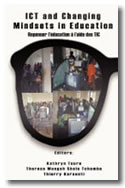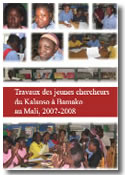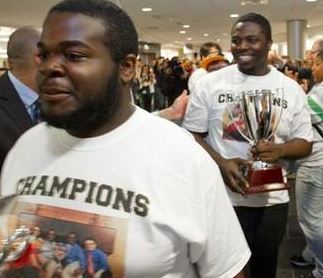KC student, debate partner bring home national titles April 16, 2013
By JOE ROBERTSON
The Kansas City Star
For anyone who was there, or watching the video online, it sure looked like Ryan Wash was in full grip of his moment in history.
The graduate of Kansas City’s Central High School had six minutes left in a two-hour debate to help his Emporia State University debate team do what had never been done before.
Two black men, bringing a fiercely personal style honed in urban debate leagues, were on the brink of winning the National Debate Tournament policy debate championship.
No all-black team had ever won that title before.
The duo, Wash and Elijah Smith, just days before had won the Cross Examination Debate Association championship.
If they were to win both titles, they’d be the first ever — black, white, urban, suburban, private-schooled or public-schooled — to pull off that feat.
“We are bringing debate home!” Wash shouted as he launched into the final rebuttal late Monday night at Weber State University in Ogden, Utah.
He was a fighter, smacking his fist into his palm. He ripped at his shirt. He pounded the table.
Their competitors in the final, from Northwestern University in Evanston, Ill., “want us to separate our theory from our flesh!” he screamed.
The Northwestern team had challenged the Emporia team’s whole approach, saying Wash and Smith were moving “dangerously” off the debate’s prescribed platform, energy production.
For years, urban debate teams have been radically testing the boundaries in a debate culture that they say rewarded the staid status quo, the middle class and elite.
Just as they might wade into research on environmental justice or global warming, the topic “energy production” could also spawn an argument against the debating process itself.
At the Cross Examination Debate Association championship at Idaho State University, Wash had summoned his tragic loss of his mother when he was 11, and his complacency in the face of alcoholism.
Only through debate had he found his voice, he said. That was his energy.
Many times over the years judges rejected such radical themes. To some, the idea of personalizing debates, even incorporating poetry and rap, made a sham of it.
But here they were, Wash and Smith, showing just how far the dogged debaters from inner cities have come. The moment was at hand when an urban-born team could be the first to win both titles.
“Today is the day we can unite the crowns!” he shouted. “We can connect to the elitest tournament of all!”
Gabe Cook, the director of the Debate-Kansas City urban debate league, watched online, seeing “Ryan make his historic argument.”
Jane Rinehart, the former debate coach at Central High School, had seen judges reject her students so many times over the years. But she also had seen great triumphs, and she sensed the moment as she watched online.
All those years watching her students, “I always knew they were good,” she said. “But (winning both of the national titles) seemed out of the realm of possibility.”
To see Wash bring the final argument home, Rinehart said, “was amazing.”
Were Wash and Smith thinking about the history in that moment?
“No,” said Wash.
“We were thinking only on the debate,” said Smith.
“You have to stay zoned in,” Wash added.
They were reliving it all Wednesday afternoon, back in Emporia, having received an indoor parade with championship banners through the student union at lunch hour.
Students and faculty lined the corridor, applauding and cheering while speakers overhead rang out with the school’s fight song. The school’s mascot, a hornet, led the way.
Some students raised fists with their little fingers crooked open — their hornet “stingers.”
They’re certainly relishing the history now.
Smith, a junior, had shown uncanny instinct and daring just being at Emporia to have this chance.
He had grown up in Newark, N.J., rising academically on the wings of urban debate and going to Rutgers University.
He became aware of Wash by reputation on the debate circuit. When he finally met him at one of the national tourneys, he sought out advice. They shared ideas frequently, sometimes on Skype.
Last fall, Wash knew that his debate partner at the time would not be back in the second semester. Wash needed a new teammate. Would Smith consider transferring to Emporia?
Smith came. “It was scary,” he admitted. And he had plenty of friends and family who were perplexed and even worried that he would leave New Jersey for Kansas.
There is no guarantee that two debaters tossed together will make a good team, Emporia debate coach Sam Maurer said.
But by their second debate earlier this year, Maurer said, “You could see the spark there. You could see the good rapport.”
They made a daring team, Maurer said, pursuing provocative arguments, and they were capable — as they showed in the championships — of hastily researching and developing a new affirmative argument in the course of a tournament, to catch opponents by surprise.
Maurer has coached several debate teams that came out of the urban leagues, and he thinks Wash and Smith’s triumph will help keep debate “salient to people at large.”
Urban debate leagues often struggle to stay strong, Cook said. Central High School, despite its rich history, doesn’t have a team at this time.
Debate teams give students a chance for structure and a chance for success they may not always find elsewhere, said Rinehart, who now leads debate teams part-time at University Academy charter school.
“When those voices are blocked out, they don’t have anybody to advocate for them,” she said.
The new champions would like it if their success inspires more students like them to walk into that debate room, or even start teams. There’s a good chance you will find your voice there, they said.
That doesn’t mean everyone will agree. Their victory over the Northwestern team was narrow. Three judges gave them the nod. Two thought Emporia’s team had strayed too far.
“One thing Ryan taught me,” Smith said, “is that debate is not worth it if you’re not saying what you truly want to say.”
This is what they fought for, Wash said.
“Everybody is welcome in debate.
“Debate can be home for you.”
To reach Joe Robertson, call 816-234-4789 or send email to jrobertson@kcstar.com.
Source: www.kansascity.com/2013/04/03/4160221/kc-student-debate-partner-bring.html




Leave a Reply